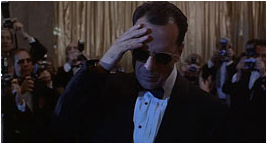"LOOKING BACK, I FIND IT A VERY SUCCESSFUL PICTURE"
 Bullett Media's Joshua Sperling asked Brian De Palma to discuss "5 of his most unforgettable films." Of course, one of the five is his newest, Passion, still pretty unforgettable. However, the most interesting portion of the article has De Palma talking about his adaptation of Tom Wolfe's The Bonfire Of The Vanities, which De Palma had originally defended, but then in more recent years, seemed to have conceded to having made some mistakes with the film by altering the source novel. Now, more than 20 years after its release, De Palma tells Sperling that he finds his film successful, after all. Sperling himself states that Bonfire "now ranks as one of De Palma’s most underrated and exuberant studies of the absurd theater of American politics."
Bullett Media's Joshua Sperling asked Brian De Palma to discuss "5 of his most unforgettable films." Of course, one of the five is his newest, Passion, still pretty unforgettable. However, the most interesting portion of the article has De Palma talking about his adaptation of Tom Wolfe's The Bonfire Of The Vanities, which De Palma had originally defended, but then in more recent years, seemed to have conceded to having made some mistakes with the film by altering the source novel. Now, more than 20 years after its release, De Palma tells Sperling that he finds his film successful, after all. Sperling himself states that Bonfire "now ranks as one of De Palma’s most underrated and exuberant studies of the absurd theater of American politics."Here is what De Palma said to Sperling about the film: "The opening tracking shot was a very important way into the film. It took about 27 or 28 takes to get it right. The idea for the shot actually came from observing Truman Capote stumbling into parties completely drunk or drugged-up. I had been to a lot of those parties and I thought that’s how it should be for Bruce’s character: the voyage from the parking garage up through all the different strata of New York high society until his arrival at the huge palm garden of the World Trade Center. I started out making political comedies, caustic commentaries about the state of our society. The Bonfire of the Vanities felt like an extension of that. When I read the book I quite liked it. I thought it was an acerbic rendering of a particular madness going on in the ’80s. When I was adapting it I thought I should make the central banker character a little more sympathetic than he was in the book, and Tom [Hanks] was a good choice for that. But, of course, the film unnerved everybody because it wasn’t like the novel, which was, by then, a treasured icon of the New York literary scene. I changed things to make the film more palatable but they ended up upsetting a lot of people and it got very bad reviews. Looking back, I find it a very successful picture. It just isn’t the book."
M:I - "IT'S EXCITING TO HAVE A BLOCKBUSTER"
Another film discussed is Mission: Impossible. "This was the first film Tom [Cruise] ever produced," De Palma tells Sperling. "Because I’d produced a couple of pictures at that point, he and his partner Paula [Wagner] at times relied on my judgment. I remember that Tom was very responsive and straightforward. There were two very difficult scenes in the film: the CIA vault scene and the one atop the train. We had a jet engine creating the wind for the train sequence. You couldn’t stand up without being blown off. The shot where Tom does the flip, that’s really dangerous stuff for anyone to do. He did it twice for us, which was very brave. We were on top of that train for weeks and weeks. As for the CIA vault, that was my idea. I’d wanted to do an incredible action sequence that was completely silent. And then I had to think of all the things that could go wrong as the character tried to lower himself upside-down into this mythic vault. It was a sequence I thought about for months and months before I actually filmed it. Whatever people say, it’s always exciting to have a blockbuster. Everybody thinks you’re a genius for 30 seconds."
THE MEGALOMANIA OF AMERICAN SOCIETY
De Palma also talks about Carrie and Scarface. Of the latter, he tells Sperling, "Some people say this film is excessive—I disagree. The script was a direct report by Oliver [Stone] on the places he visited in Miami. He saw all the clubs, the coke on the tables. People were cutting each other up with chainsaws! We had a battle with the MPAA because they wanted to give it an X rating. We even had narcotics cops from Florida come to testify that people should see this film because it showed what was actually happening. On a deeper, thematic level, Scarface is about something that recurs in a lot of my films: the megalomania of American society that can lead to excessiveness, greed, and very cruel interplays between people who are desperate to stay on top. Wealth and power isolates you. Whether you’re Walt Disney or Hugh Hefner, you create a bubble around yourself. It’s that old cliché: power corrupts and absolute power corrupts absolutely. Pacino conveyed that perfectly. He kept his Cuban accent, on- and off-set. His sidekick in the film, Steven Bauer, was Cuban, so they were constantly speaking in that accent during the shoot. There are a lot of quotable moments in the film but my favorite is, ‘Every day above ground is a good day.’"
Updated: Friday, August 9, 2013 5:55 PM CDT
Post Comment | View Comments (2) | Permalink | Share This Post



